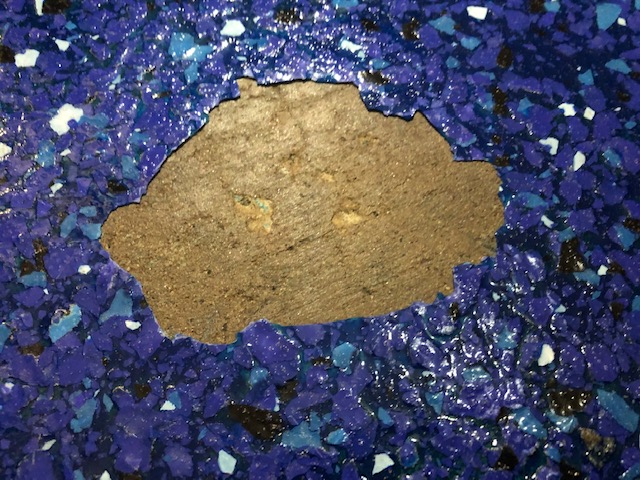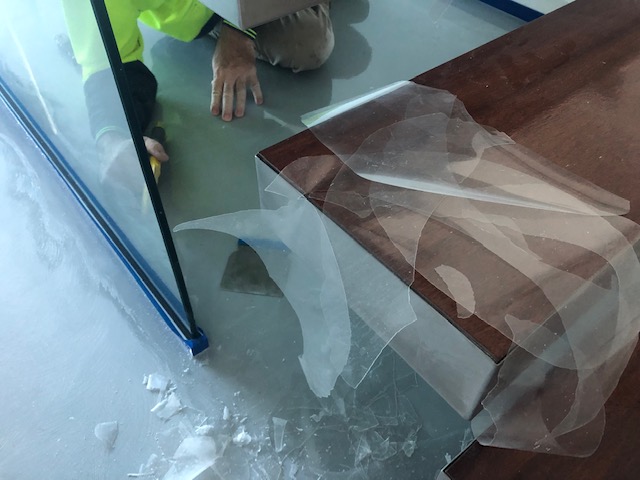Not All Epoxies Are Created Equally: When Is Epoxy Not Epoxy?

It will come as no surprise to you when we say we love epoxy coating as a floor covering. It’s tough, easy to care for, and stylish enough to use inside your home, office or showroom. And don’t get us started on how good it looks outdoors, whatever the weather.
But like any high-quality, highly desirable product, there are plenty of impersonators, and while they may claim to be “just as good, only cheaper”, they come with their share of pitfalls.
What is a true epoxy coating?
The term “epoxy” denotes the materials used, and by implication, the application process. A true epoxy coating includes a resin component that is mixed with a hardener, then applied under specific conditions – temperature and time being the most critical. (Think of mixing Araldite – once mixed, the components need to be applied quickly and accurately for the adhesive to do its job.)
While there are products out there that call themselves epoxy “paint”, this is more of a consumer-focused name – people associate the application with painting, and so hardware suppliers use the term to help their customers find the product more easily. Unfortunately, this does nothing to clear up the confusion of what is a true epoxy finish.
What is epoxy paint?
Also referred to as one-part epoxy, as it doesn’t require the mixing process of a true epoxy coating. What is termed epoxy paint is a paint product – usually an acrylic or latex base – with some epoxy in the mix. While it is more durable than standard acrylic paint, it doesn’t have the resilience of a true epoxy coating.
Epoxy paint doesn’t need any special application, other than a roller or paint brush and is usually just given a single coat. While that may be a much easier option than laying an epoxy coating, it will start to show signs of wear after a relatively short time.
If the surface beneath is stained or hasn’t been properly prepared, large chunks of paint can start to chip off. Whether you’ve invested the time to do the work yourself, or paid a contractor, seeing this deterioration so soon – it can start cracking and flaking after only a few months in high traffic areas – it’s no less a disheartening and disappointing sight. Not to mention a deceptively false economy, as it will need regular replacing.
A true epoxy floor coating involves a lot of preparation – a process you may forget once the floor is down, but one that will perform and last for years to come. Where an epoxy paint might stain, crack, chip or wear; an epoxy coating is highly resistant to all of these degraders. It is by no means invulnerable, but its’ hardwearing, easy-care features make it highly attractive – in both form and function – for a wide range of applications.
To DIY or not to DIY
Applying an epoxy floor coating is, as we’ve described above, more than a simple paint job. There are several things you need to consider before you decide whether this is a project you want to take on yourself.
First up: Materials. Check the product label. Does it describe itself as epoxy paint or one-part epoxy? Remember, it can still be an epoxy coating if it describes itself as “paint”. What instructions does it give for applying it? If it is part of a kit, or describes itself as having a resin base (as opposed to an acrylic one), you’re on the right track. The price will also be an indicator – true epoxy coating will be more expensive. An epoxy coating will also need time to “cure” so the necessary chemical reactions can complete and give you a strong, and beautiful, finish that will stand the test of time.
Next: The Process. Once your epoxy floor is applied, it will give you years of tireless service, assuming you get it right. Once you’ve mixed your epoxy components, you will have a limited time to apply your coating. Again, you need to check the product label, which should give you an idea of how long you have to complete the application after mixing the epoxy.
Temperature plays a big part of a successful application. A significant difference between the temperature of your epoxy and your floor can have a big impact on how long it takes it to cure. And if your project surface is chemically contaminated, for instance with oil or solvent, the final bond may be compromised (or worse, not set at all).
DIY epoxy floor coating can be a complex process. Of course, like any DIY project, it does come with an element of risk. Reputable suppliers will not sell quality epoxy products to DIYers.
If you’re still not sure whether you want to take on the challenge yourself, it costs you nothing more than a little time to get a quote from an experienced (and insured) professional.
Contact us today for advice and a quote. We’ll assess your floor and provide expert advice on what can and cannot be done with your floor, and the best approach to take.


